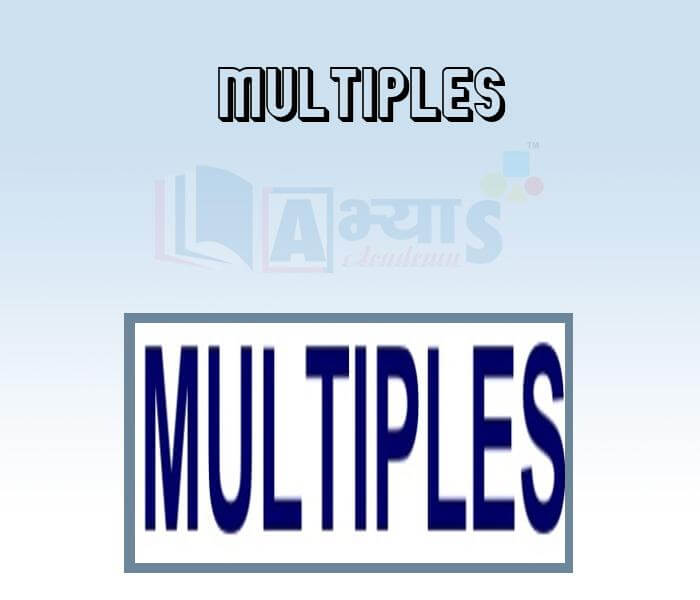Multiples








Multiples
Multiples:
When we write a number 20 as we say 4 and 5 are factors of 20. We also say that 20 is a multiple of 4 and 5.
The representation shows that 2 and 12 are factors of 24, whereas 24 is a multiple of 2 and 12.
We say that the numbers 3, 6, 9, 12, 15 are multiples of 3.
The list of multiples of 3 can be continued as 18, 21, 24,...
Each of these multiples is greater than or equal to 3.
The multiple of the number 4 are 4, 8, 12, 16, 20, 24,...
The list is endless. Each of these numbers is greater than or equal to 4.
1. What are the multiples of 7? Obviously, 7, 14, 21, 28,... You will find that each of these multiples is greater than or equal to 7. Will it happen with each number? Check this for the multiples of 6, 9 and 10.
We find that every multiple of a number is greater than or equal to that number.
2. Write the multiples of 5. They are 5, 10, 15, 20,... Do you think this list will end anywhere? No! The list is endless. Try it with multiples of 6, 7 etc.
We find that the number of multiples of a given number is infinite.
3. Can 7 be a multiple of itself? Yes, becuase Will it be true for other numbers also? Try it iwth 3, 12 and 16.
You will find that every number is a multiple of itself.
The factor f 6 are 1, 2, 3 and 6 . Also, 1+2+3+6 = 12 = 2 6. We find that the sum of the factor of 6 is twice the number 6. All the factors of 28 are 1,2,4,7,14, and 28. Adding these we have, 1+2+4+7+14+28 = 56 = 2
28.
The sum of the factors of 28 is equal to twice the number 28.
4. A number for which sum of all its factors is equal to twice the number is called a perfect number. The numbers 6 and 28 are perfect numbers.
Find the multiple of 5 which lies in between 17 and 23. | |||
| Right Option : B | |||
| View Explanation | |||
A class monitor helped his teacher to collect some money from 54 students for a picnic outing. The record of money collected was accidentally smeared with water and only 3 digits of the total cash amount, | |||
| Right Option : B | |||
| View Explanation |
1 is ________________ | |||
| Right Option : C | |||
| View Explanation | |||
Students / Parents Reviews [10]
I have spent a wonderful time in Abhyas academy. It has made my reasoning more apt, English more stronger and Maths an interesting subject for me. It has given me a habbit of self studying

Yatharthi Sharma
10thMy experience with Abhyas is very good. I have learnt many things here like vedic maths and reasoning also. Teachers here first take our doubts and then there are assignments to verify our weak points.

Shivam Rana
7thMy experience with Abhyas academy is very good. I did not think that my every subject coming here will be so strong. The main thing is that the online tests had made me learn here more things.

Hiya Gupta
8thAbhyas is a complete education Institute. Here extreme care is taken by teacher with the help of regular exam. Extra classes also conducted by the institute, if the student is weak.

Om Umang
10thAbout Abhyas metholodology the teachers are very nice and hardworking toward students.The Centre Head Mrs Anu Sethi is also a brilliant teacher.Abhyas has taught me how to overcome problems and has always taken my doubts and suppoeted me.

Shreya Shrivastava
8thA marvelous experience with Abhyas. I am glad to share that my ward has achieved more than enough at the Ambala ABHYAS centre. Years have passed on and more and more he has gained. May the centre flourish and develop day by day by the grace of God.

Archit Segal
7thIt was a good experience with Abhyas Academy. I even faced problems in starting but slowly and steadily overcomed. Especially reasoning classes helped me a lot.

Cheshta
10thIt was good as the experience because as we had come here we had been improved in a such envirnment created here.Extra is taught which is beneficial for future.

Eshan Arora
8thIt has a great methodology. Students here can get analysis to their test quickly.We can learn easily through PPTs and the testing methods are good. We know that where we have to practice

Barkha Arora
10thMy experience was very good with Abhyas academy. I am studying here from 6th class and I am satisfied by its results in my life. I improved a lot here ahead of school syllabus.
